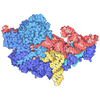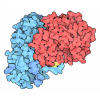+ Open data
Open data
- Basic information
Basic information
| Entry | Database: PDB / ID: 6x2y | |||||||||
|---|---|---|---|---|---|---|---|---|---|---|
| Title | Crystal Structure of mDia2NES peptide bound to CRM1(E571K) | |||||||||
 Components Components |
| |||||||||
 Keywords Keywords | PROTEIN TRANSPORT / Nuclear export / CRM1 / XPO1 / Exportin-1 | |||||||||
| Function / homology |  Function and homology information Function and homology informationprotein-containing complex remodeling / stereocilia tip-link density / ESCRT I complex / inner ear receptor cell differentiation / actin nucleation / head development / erythrocyte enucleation / podosome assembly / actin crosslink formation / autophagosome-lysosome fusion ...protein-containing complex remodeling / stereocilia tip-link density / ESCRT I complex / inner ear receptor cell differentiation / actin nucleation / head development / erythrocyte enucleation / podosome assembly / actin crosslink formation / autophagosome-lysosome fusion / tRNA re-export from nucleus / : / ribbon synapse / pre-miRNA export from nucleus / RNA nuclear export complex / snRNA import into nucleus / Regulation of HSF1-mediated heat shock response / Transcriptional and post-translational regulation of MITF-M expression and activity / manchette / nuclear export signal receptor activity / cellular response to mineralocorticoid stimulus / negative regulation of microtubule depolymerization / Regulation of cholesterol biosynthesis by SREBP (SREBF) / tRNA export from nucleus / SUMOylation of SUMOylation proteins / protein localization to kinetochore / importin-alpha family protein binding / cell projection organization / spindle pole body / RHOD GTPase cycle / Rev-mediated nuclear export of HIV RNA / U4 snRNA binding / nuclear export / Nuclear import of Rev protein / SUMOylation of RNA binding proteins / protein localization to nucleolus / RHOF GTPase cycle / NEP/NS2 Interacts with the Cellular Export Machinery / RNA export from nucleus / tRNA processing in the nucleus / GTP metabolic process / Postmitotic nuclear pore complex (NPC) reformation / SUMOylation of chromatin organization proteins / nuclear import signal receptor activity / endosomal transport / MicroRNA (miRNA) biogenesis / RHOB GTPase cycle / DNA metabolic process / RHOC GTPase cycle / MAPK6/MAPK4 signaling / actin filament bundle / RHOJ GTPase cycle / filamentous actin / establishment of cell polarity / RHOQ GTPase cycle / dynein intermediate chain binding / microtubule polymerization / microtubule organizing center / cleavage furrow / CDC42 GTPase cycle / actin filament bundle assembly / mitotic sister chromatid segregation / macrophage differentiation / viral process / U5 snRNA binding / RHOG GTPase cycle / RHOA GTPase cycle / RAC2 GTPase cycle / spermatid development / RAC3 GTPase cycle / ribosomal large subunit export from nucleus / U2 snRNA binding / U6 snRNA binding / nuclear pore / U1 snRNA binding / sperm flagellum / positive regulation of protein binding / mRNA export from nucleus / ribosomal subunit export from nucleus / actin filament polymerization / ribosomal small subunit export from nucleus / RAC1 GTPase cycle / cytoskeleton organization / centriole / GTPase activator activity / protein export from nucleus / mitotic spindle organization / integrin-mediated signaling pathway / male germ cell nucleus / actin filament / hippocampus development / chromosome segregation / Transcriptional regulation by small RNAs / sensory perception of sound / G1/S transition of mitotic cell cycle / RHO GTPases Activate Formins / recycling endosome / kinetochore / positive regulation of protein import into nucleus / small GTPase binding Similarity search - Function | |||||||||
| Biological species |  Homo sapiens (human) Homo sapiens (human) | |||||||||
| Method |  X-RAY DIFFRACTION / X-RAY DIFFRACTION /  SYNCHROTRON / SYNCHROTRON /  MOLECULAR REPLACEMENT / Resolution: 2.304 Å MOLECULAR REPLACEMENT / Resolution: 2.304 Å | |||||||||
 Authors Authors | Baumhardt, J.M. | |||||||||
| Funding support | 2items
| |||||||||
 Citation Citation |  Journal: Mol.Biol.Cell / Year: 2020 Journal: Mol.Biol.Cell / Year: 2020Title: Recognition of nuclear export signals by CRM1 carrying the oncogenic E571K mutation. Authors: Baumhardt, J.M. / Walker, J.S. / Lee, Y. / Shakya, B. / Brautigam, C.A. / Lapalombella, R. / Grishin, N. / Chook, Y.M. | |||||||||
| History |
|
- Structure visualization
Structure visualization
| Structure viewer | Molecule:  Molmil Molmil Jmol/JSmol Jmol/JSmol |
|---|
- Downloads & links
Downloads & links
- Download
Download
| PDBx/mmCIF format |  6x2y.cif.gz 6x2y.cif.gz | 301.8 KB | Display |  PDBx/mmCIF format PDBx/mmCIF format |
|---|---|---|---|---|
| PDB format |  pdb6x2y.ent.gz pdb6x2y.ent.gz | 232.7 KB | Display |  PDB format PDB format |
| PDBx/mmJSON format |  6x2y.json.gz 6x2y.json.gz | Tree view |  PDBx/mmJSON format PDBx/mmJSON format | |
| Others |  Other downloads Other downloads |
-Validation report
| Arichive directory |  https://data.pdbj.org/pub/pdb/validation_reports/x2/6x2y https://data.pdbj.org/pub/pdb/validation_reports/x2/6x2y ftp://data.pdbj.org/pub/pdb/validation_reports/x2/6x2y ftp://data.pdbj.org/pub/pdb/validation_reports/x2/6x2y | HTTPS FTP |
|---|
-Related structure data
| Related structure data | 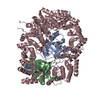 6x2mC 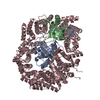 6x2oC 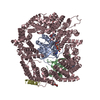 6x2pC  6x2rC  6x2sC  6x2uC  6x2vC  6x2wC  6x2xC 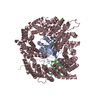 4hb2S S: Starting model for refinement C: citing same article ( |
|---|---|
| Similar structure data |
- Links
Links
- Assembly
Assembly
| Deposited unit | 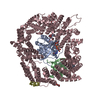
| ||||||||
|---|---|---|---|---|---|---|---|---|---|
| 1 |
| ||||||||
| Unit cell |
|
- Components
Components
-Protein , 3 types, 3 molecules ABC
| #1: Protein | Mass: 24456.105 Da / Num. of mol.: 1 Source method: isolated from a genetically manipulated source Source: (gene. exp.)  Homo sapiens (human) / Gene: RAN, ARA24, OK/SW-cl.81 / Production host: Homo sapiens (human) / Gene: RAN, ARA24, OK/SW-cl.81 / Production host:  |
|---|---|
| #2: Protein | Mass: 16320.687 Da / Num. of mol.: 1 Source method: isolated from a genetically manipulated source Source: (gene. exp.)  Gene: YRB1, CST20, HTN1, SFO1, YDR002W, YD8119.08 / Production host:  |
| #3: Protein | Mass: 117442.875 Da / Num. of mol.: 1 / Mutation: E582K Source method: isolated from a genetically manipulated source Source: (gene. exp.)  Gene: CRM1, KAP124, XPO1, YGR218W, G8514 / Production host:  |
-Protein/peptide , 1 types, 1 molecules D
| #4: Protein/peptide | Mass: 1226.512 Da / Num. of mol.: 1 / Fragment: residues 1183-1193 Source method: isolated from a genetically manipulated source Source: (gene. exp.)  Homo sapiens (human) / Gene: DIAPH3, DIAP3 / Production host: Homo sapiens (human) / Gene: DIAPH3, DIAP3 / Production host:  |
|---|
-Non-polymers , 5 types, 472 molecules 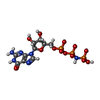

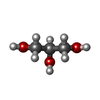
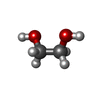





| #5: Chemical | ChemComp-GNP / | ||||
|---|---|---|---|---|---|
| #6: Chemical | ChemComp-MG / | ||||
| #7: Chemical | | #8: Chemical | ChemComp-EDO / | #9: Water | ChemComp-HOH / | |
-Details
| Has ligand of interest | N |
|---|
-Experimental details
-Experiment
| Experiment | Method:  X-RAY DIFFRACTION / Number of used crystals: 1 X-RAY DIFFRACTION / Number of used crystals: 1 |
|---|
- Sample preparation
Sample preparation
| Crystal | Density Matthews: 2.71 Å3/Da / Density % sol: 54.63 % |
|---|---|
| Crystal grow | Temperature: 273 K / Method: vapor diffusion, hanging drop Details: 17% (weight/vol) PEG3350, 100 mM Bis-Tris (pH 6.4), 200 mM ammonium nitrate, and 10 mM Spermine HCl |
-Data collection
| Diffraction | Mean temperature: 93 K / Serial crystal experiment: N | |||||||||||||||||||||||||||||||||||||||||||||||||||||||||||||||||||||||||||||||||||||||||||||||||||||||||||||||||||||||||||||||||||||||||||||||||||||||||||||||||||||||||||||||||||||||||||||
|---|---|---|---|---|---|---|---|---|---|---|---|---|---|---|---|---|---|---|---|---|---|---|---|---|---|---|---|---|---|---|---|---|---|---|---|---|---|---|---|---|---|---|---|---|---|---|---|---|---|---|---|---|---|---|---|---|---|---|---|---|---|---|---|---|---|---|---|---|---|---|---|---|---|---|---|---|---|---|---|---|---|---|---|---|---|---|---|---|---|---|---|---|---|---|---|---|---|---|---|---|---|---|---|---|---|---|---|---|---|---|---|---|---|---|---|---|---|---|---|---|---|---|---|---|---|---|---|---|---|---|---|---|---|---|---|---|---|---|---|---|---|---|---|---|---|---|---|---|---|---|---|---|---|---|---|---|---|---|---|---|---|---|---|---|---|---|---|---|---|---|---|---|---|---|---|---|---|---|---|---|---|---|---|---|---|---|---|---|---|---|
| Diffraction source | Source:  SYNCHROTRON / Site: SYNCHROTRON / Site:  APS APS  / Beamline: 19-ID / Wavelength: 0.9795 Å / Beamline: 19-ID / Wavelength: 0.9795 Å | |||||||||||||||||||||||||||||||||||||||||||||||||||||||||||||||||||||||||||||||||||||||||||||||||||||||||||||||||||||||||||||||||||||||||||||||||||||||||||||||||||||||||||||||||||||||||||||
| Detector | Type: ADSC QUANTUM 315r / Detector: CCD / Date: Jan 15, 2017 | |||||||||||||||||||||||||||||||||||||||||||||||||||||||||||||||||||||||||||||||||||||||||||||||||||||||||||||||||||||||||||||||||||||||||||||||||||||||||||||||||||||||||||||||||||||||||||||
| Radiation | Protocol: SINGLE WAVELENGTH / Monochromatic (M) / Laue (L): M / Scattering type: x-ray | |||||||||||||||||||||||||||||||||||||||||||||||||||||||||||||||||||||||||||||||||||||||||||||||||||||||||||||||||||||||||||||||||||||||||||||||||||||||||||||||||||||||||||||||||||||||||||||
| Radiation wavelength | Wavelength: 0.9795 Å / Relative weight: 1 | |||||||||||||||||||||||||||||||||||||||||||||||||||||||||||||||||||||||||||||||||||||||||||||||||||||||||||||||||||||||||||||||||||||||||||||||||||||||||||||||||||||||||||||||||||||||||||||
| Reflection | Resolution: 2.3→50 Å / Num. obs: 113739 / % possible obs: 100 % / Redundancy: 20.6 % / Rmerge(I) obs: 0.319 / Rpim(I) all: 0.071 / Rrim(I) all: 0.327 / Χ2: 0.975 / Net I/σ(I): 3.4 | |||||||||||||||||||||||||||||||||||||||||||||||||||||||||||||||||||||||||||||||||||||||||||||||||||||||||||||||||||||||||||||||||||||||||||||||||||||||||||||||||||||||||||||||||||||||||||||
| Reflection shell | Diffraction-ID: 1
|
- Processing
Processing
| Software |
| ||||||||||||||||||||||||||||||||||||||||||||||||||||||||||||||||||||||||||||||||||||||||||||||||||||||||||||||||||||||||||||||||||||||||||
|---|---|---|---|---|---|---|---|---|---|---|---|---|---|---|---|---|---|---|---|---|---|---|---|---|---|---|---|---|---|---|---|---|---|---|---|---|---|---|---|---|---|---|---|---|---|---|---|---|---|---|---|---|---|---|---|---|---|---|---|---|---|---|---|---|---|---|---|---|---|---|---|---|---|---|---|---|---|---|---|---|---|---|---|---|---|---|---|---|---|---|---|---|---|---|---|---|---|---|---|---|---|---|---|---|---|---|---|---|---|---|---|---|---|---|---|---|---|---|---|---|---|---|---|---|---|---|---|---|---|---|---|---|---|---|---|---|---|---|---|
| Refinement | Method to determine structure:  MOLECULAR REPLACEMENT MOLECULAR REPLACEMENTStarting model: 4HB2 Resolution: 2.304→45.769 Å / SU ML: 0.29 / Cross valid method: THROUGHOUT / σ(F): 1.35 / Phase error: 27.82 / Stereochemistry target values: ML
| ||||||||||||||||||||||||||||||||||||||||||||||||||||||||||||||||||||||||||||||||||||||||||||||||||||||||||||||||||||||||||||||||||||||||||
| Solvent computation | Shrinkage radii: 0.9 Å / VDW probe radii: 1.11 Å / Solvent model: FLAT BULK SOLVENT MODEL | ||||||||||||||||||||||||||||||||||||||||||||||||||||||||||||||||||||||||||||||||||||||||||||||||||||||||||||||||||||||||||||||||||||||||||
| Displacement parameters | Biso max: 128.39 Å2 / Biso mean: 38.671 Å2 / Biso min: 8.95 Å2 | ||||||||||||||||||||||||||||||||||||||||||||||||||||||||||||||||||||||||||||||||||||||||||||||||||||||||||||||||||||||||||||||||||||||||||
| Refinement step | Cycle: final / Resolution: 2.304→45.769 Å
| ||||||||||||||||||||||||||||||||||||||||||||||||||||||||||||||||||||||||||||||||||||||||||||||||||||||||||||||||||||||||||||||||||||||||||
| Refine LS restraints |
| ||||||||||||||||||||||||||||||||||||||||||||||||||||||||||||||||||||||||||||||||||||||||||||||||||||||||||||||||||||||||||||||||||||||||||
| LS refinement shell | Refine-ID: X-RAY DIFFRACTION / Rfactor Rfree error: 0
|
 Movie
Movie Controller
Controller





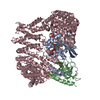


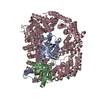
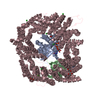
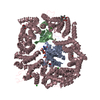
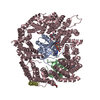
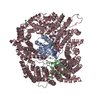
 PDBj
PDBj


